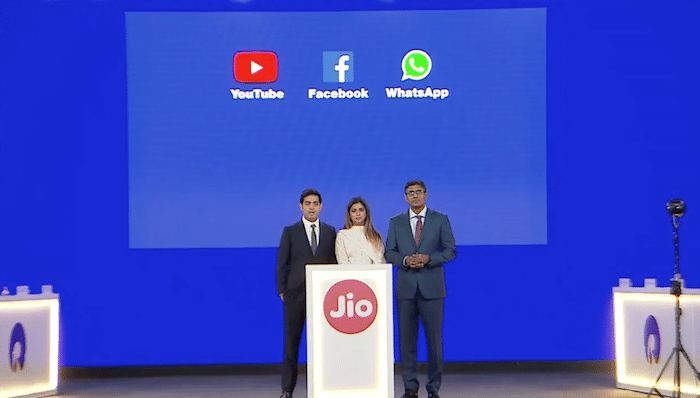WhatsApp working with Reliance Jio to stop fake news
September 27, 2018 | Expert Insights

Facebook’s WhatsApp is working closely with Reliance Jio to spread awareness of false messages, weeks after the Indian telecoms operator opened up the messaging service to tens of millions of customers.
Background
The term “fake news” has become increasingly popular due to its linkage to debates surrounding the democratic process and free speech in the information age. It refers to news stories that intentionally spread misinformation or false facts. In recent years, the growth of social media has enabled the spread of misinformation. Tech giants like Google, Facebook and Twitter have been grappling with addressing the rise of “fake news” and misinformation online.
Fake news and misinformation spread via social media such as Facebook, Twitter and WhatsApp are a growing problem in India. In recent months, WhatsApp messages have inspired deadly attacks across the country.
India is one of the largest user bases for WhatsApp, with many small-scale organisations adopting the WhatsApp model to conduct their daily business over the app. It has been generally remarked that Indian WhatsApp users have a characteristic trait of forwarding large volumes of messages to their contacts, akin to the chain-email phenomenon of the early 2000s. While this may result in pleasant “Good Morning” messages, it is also a fertile conduit for rumours, or more accurately, “fake news”.
Previous, WhatsApp had denied helping the government access its encryptions services to “weed out” fake news. Read more about it here.
Analysis
Facebook’s WhatsApp is working closely with Reliance Jio to spread awareness of false messages, weeks after the Indian telecoms operator opened up the messaging service to tens of millions of customers using its cheap internet-enabled phone.
Jio this month gave its more than 25 million JioPhone customers, many of them first-time internet users, access to WhatsApp at a time when the messaging service is battling false and incendiary texts and videos circulating on its platform.
Reliance Chairman Mukesh Ambani, India’s richest man, launched the JioPhone last year at a refundable deposit of 1,500 rupees ($20.60). The device is internet enabled but didn’t initially allow the use of WhatsApp or have several popular smartphone features.
All new users of the JioPhone get educational material that tells them about spotting a forwarded WhatsApp message and encourages them to share messages thoughtfully, WhatsApp spokesman Carl Woog told Reuters. “We are working closely with Jio to continue our education campaign for WhatsApp users,” Woog said.
In India’s smaller towns and villages, deep-seated prejudices, often based on caste and religion, and cut-price mobile data can aggravate the so-called fake news problem. Such regions are a key market for cheap devices such as the JioPhone.
More than 30 people have died this year in mob violence triggered by vitriolic messages on social media and WhatsApp, according to unofficial estimates. Police have previously told Reuters that minorities have been targeted in some remote and rural regions. This has prompted New Delhi to call on WhatsApp to take immediate action to “end this menace”.
WhatsApp has already taken some steps to quell the rise of fake news. It has launched print and radio ad campaigns to educate users and introduced new features on the app including limiting message forwards as well as the labelling of forwarded messages. It has also partnered with the Digital Empowerment Foundation (DEF), a New Delhi-based non-profit organization, to spread digital literacy in India’s towns and cities.
DEF will host a workshop in the eastern Indian city of Ranchi this week, WhatsApp’s Woog said.
With more than 200 million users, India is a key market for WhatsApp but one where it has had to delay the official launch of its payments services due to the country’s push on data localization. WhatsApp is currently looking for an India chief and a policy head for the country.
Counterpoint
WhatsApp had earlier denied helping the Indian government in weeding out the fake news menace. The Ministry of Broadcast and Information has earlier asked WhatsApp to trace the origin of fake news, which would require the social media company to violate the privacy of its users. Their agreement to team up with Reliance, a company already accused of being favoured by the government, is suspicious.
Reliance’s Jio has already used dubious tactics to dominate the low-cost Indian telecom market and has recently released a new basic smartphone which will run WhatsApp but not other messaging apps. It is entirely possible that Jio is using its influence with the government to monopolise the WhatsApp user base as well as fight what the government perceives as “fake news”.
Assessment
Our assessment is that the Reliance Jio is trying to achieve multiple objectives with this curveball. India is gearing up for a volatile election year ahead of the May 2019 polls, therefore it is prudent of the incumbent government to track any malicious news or rumours, that is targeted against them. We believe that Reliance is using its influence with the government to help its own cause as well as weed out “Fake news” which will be directed towards the government. We also feel that this exclusive partnership is a way to monopolise the low-cost smartphone market for Reliance.








Comments